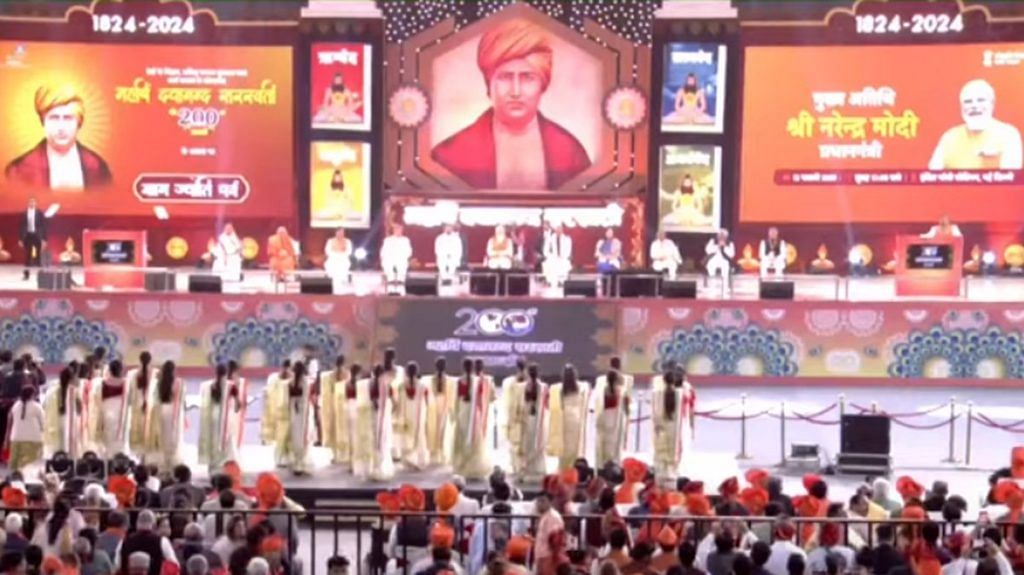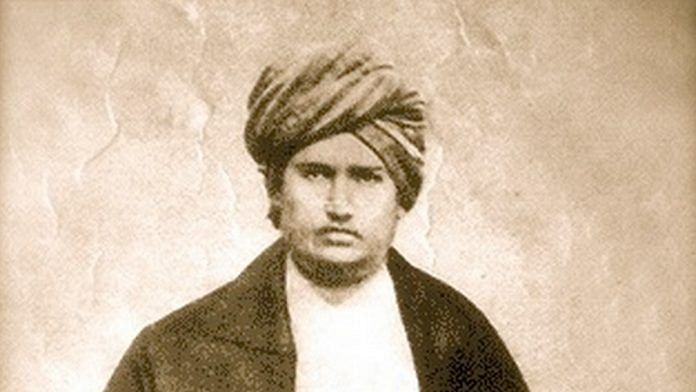Chennai: Amid wars, social inequalities, and the looming challenges of climate change, Maharshi Dayanand Saraswati, the founder of the Arya Samaj—a movement advocating for a unified Hindu society—is being increasingly recognised for his progressive teachings and emphasis on spiritual renewal. His 200th birth anniversary, 12 February, is a fitting time to revisit his influential ideas and lasting impact.
Last February, when Prime Minister Narendra Modi inaugurated the year-long celebrations commemorating Dayanand’s birth anniversary, he noted that the spiritual leader was a “beacon of knowledge” who could show a path and instill hope in a world engulfed by violence and instability.
A visionary who is considered ahead of his time, Dayanand Saraswati is known for his cultural nationalism and efforts to instill inclusive values in thought, word, and deed. A leading proponent of gender equity, social inclusion, and spiritual grounding, his revolutionary ideas inspired many of India’s leading lights over the generations, but he has often been relegated to the margins of history, with his contemporary relevance overlooked by many.
Also Read: Tamil Nadu’s architect Annadurai questioned ‘Hindi imposition’, drove Congress out of Madras
Swaraj to Vedic unity
Born in 1824 into a Brahmin family in Tankara, Gujarat, Dayanand Saraswati was known as Moola Shankar before he adopted asceticism in his youth. In 1875, he established the Arya Samaj, advocating for a revival of Vedic teachings and challenging idol worship and excessive rituals.
His seminal 1875 work, Satyarth Prakash (Light of Truth), tackled an extensive range of themes – religious, social, educational, political, moral, and spiritual – all anchored in the Vedas. This book alludes to Dayanand’s (and many visionary Hindu teachers’) belief in the integration of material and spiritual needs.
The power of Sanatana Dharma is that it is accommodative in nature. A key example of this is Buddha, who, despite offering critiques of Hindu practices, finds his place within the ten avatars of Lord Vishnu, the Dashavatar. The widespread acceptance of Dayanand’s point of view, his darshana (philosophy), and his practices also speak of this. This suggests that Sanatana Dharma’s ability to embrace diverse perspectives played a crucial role in its preservation, promotion, and evolution, allowing it to stand the test of time.

Maharshi Dayanand Saraswati’s teachings resonated deeply with the spirit of Indian nationalism and self-determination. He sounded the call for ‘Swaraj,’ or self-rule, decades before it became a rallying cry for the Indian independence movement. His thoughts were an inspiration for numerous freedom fighters, including Bhagat Singh, Lala Lajpat Rai, Shyamji Krishna Varma, and Mahatma Gandhi, to name a few. Dayanand Saraswati is also considered by many one of the active architects of the first war of independence in 1857.
Dayanand’s passion for India’s upliftment and spiritual renewal fuelled his fervent advocacy for a return to the Vedas, the ancient Indian scriptures, as the fountainhead of wisdom and knowledge. He is also credited with establishing the first goshala (cow shelter) in Haryana in 1874.
Sri Aurobindo, another luminary of Indian thought, emphasised the importance of delving into the depths of the Vedas to understand Dayanand’s message. He identified Dayanand as among the first to uncover the hidden truths within the Vedas, elucidating the psychological aspects of divine nature and the cosmic laws governing the universe. For Dayanand, according to Sri Aurobindo, the Vedas were not just religious texts but repositories of cosmic knowledge, offering insights into the laws of creation and the principles of existence.
In his seminal work, The Secret of the Veda, Sri Aurobindo underscored the urgency of recovering the perfect truth of the Vedas for the future of humanity and Hinduism as a way of life. He echoed Dayanand’s call for a return to Vedic philosophy and understanding, stressing on its centrality to Indian civilisation and culture. Both Dayanand Saraswati and Sri Aurobindo were staunch advocates of unity and interconnection, rejecting all forms of human division and emphasising the underlying oneness of existence.
Mahrishi Dayanand Saraswati’s legacy extends beyond the realm of philosophical discourse to tangible social reform and empowerment. Through the establishment of the Arya Samaj, he sought to create a society based on the principles of truth, righteousness, and social justice. His teachings inspired countless individuals to challenge social norms and strive for a more just and equitable society.
Also Read: Lenin to Gandhi & Einstein, the controversial cross-continental legacy of CPI founder MN Roy
Modern relevance
In contemporary India, the ideals espoused by Dayanand are still relevant as the nation grapples with pressing social, economic, and environmental challenges. He endorsed a timeless message of Indian thought— ekam sat viprah bahudha vadanti (there is one truth, spoken of in many ways). For him, this single truth was enshrined in the Vedas. As Sri Aurobindo outlined in The Secret of The Veda, Dayanand interpreted the Vedas as a complete revelation of religious, ethical, and scientific truth. “Its religious teaching is monotheistic and the Vedic gods are different descriptive names of the one Deity,” he wrote. True understanding of the Vedas, he added, could unlock all the “scientific truths that have been discovered by modern research”.
In the 15 January 1910 edition of his weekly journal Karmayogin, Aurobindo also highlighted Dayanand’s espousal of complete freedom. “[I]ndependence is the true and normal condition of a nation and all lapse into subjection must be a sin and degeneration, temporary in its nature,” he wrote. Aryanism in its essence, Aurobindo noted, was a “gospel of freedom—individual freedom, social freedom, intellectual freedom, freedom in all things”. And further, “the accomplishment of such an all-pervading liberation cannot come about without bringing national freedom in its train”.
While Maharshi Dayanand critiqued other religions, he did not promote hostility towards them. He stood for and by the truth. He ensured sensitivity even while upholding the primacy of the Vedas, being a firm believer that it was open to all, regardless of caste, creed, sex, or nationality.
Former President of India Dr S Radhakrishnan noted in a 1963 speech that “among the makers of India, the chief place will be assigned to [Dayanand].” He added that at a time of “spiritual confusion” and superstition, “this great soul came forward with staunch devotion to truth and a passion for social equality”.
Radhakrishnan further said that Dayanand used the force of his “crusading zeal” and “powerful intellect” to eradicate social injustices. “He tried to sweep them away with a drastic hand. This is also what the country requires today… he emphasised the rule of reason and pointed out that there is one Supreme God. He also gave freedom of conscience,” Radhakrishnan added in the same speech.
It is important that today’s India contextualise Maharshi Dayanand’s life and lessons. Whether it’s navigating climate change, communicating Indian philosophy, or evaluating oneself, there is so much one can learn and contemplate from Dayanand’s teachings. It is befitting to his work and principles that India’s first tribal President, Droupadi Murmu, is participating in the forthcoming birth anniversary celebration.
Today, Dayanand Anglo Vedic (DAV) schools are imparting education to many students and the Arya Samaj community has a presence in over 30 countries, from Australia and Canada to Kenya, Singapore, and Mauritius. In a world where debate rages between conservatism and liberalism, it’s worth pondering upon one of Dayanand’s core values—standing for the truth.



